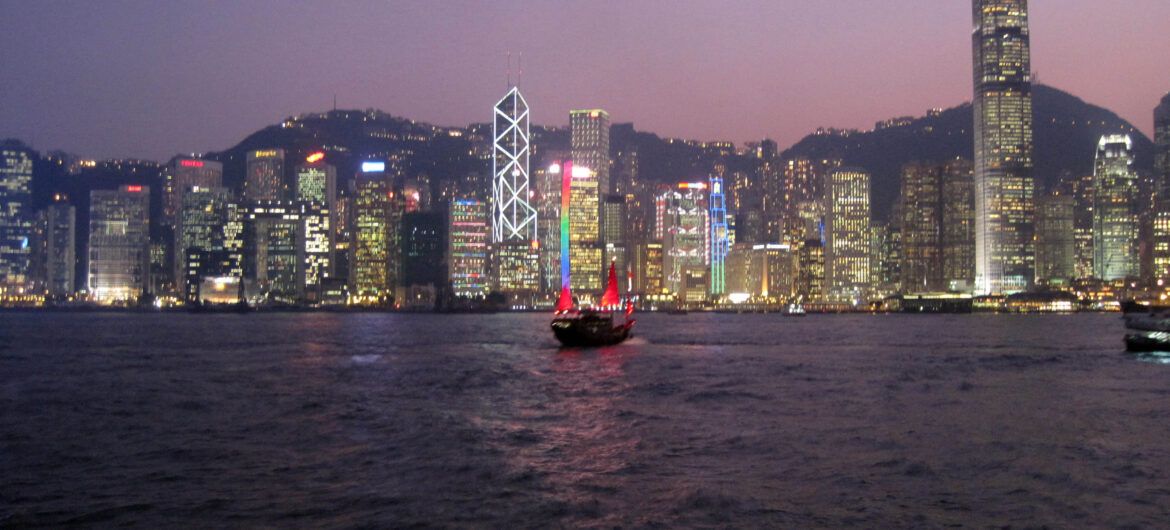Words by Ewan Vellinga
“Conspiracy to commit subversion” is what 47 people have been charged with in Hong Kong under a National Security Law introduced last year.
Those charged were arrested on 6 January and are accused of helping run an “unofficial primary election” last June.
This included picking opposition candidates for the 2020 legislative elections, which were later postponed, and trying to “overthrow” the government.
The defendants include prominent pro-democracy activists Benny Tai, former professor at the University of Hong Kong, and Jimmy Sham, a political and LGBT rights activist.
Altogether around 55 people were arrested in January under the new law, and the number has risen to 100 as of 2 March.
Most of the defendants objected to government requests to keep them in jail, and hearings started on 1 March to see if they would receive bail before the trials begin. 15 were granted bail, but they remain in police custody as prosecutors appeal the court’s decision.
They are not the only ones who have been charged under the new law. At least 10 more people are also facing trial, including prominent media tycoon Jimmy Lai, detained earlier this month.
However, none of the trials have yet begun in full.
The BBC reports that Tong Ying-Kit, accused of riding a motorcycle into police officers in July, is likely to be first. He is expected to be tried by three judges rather than a jury.
These arrests are the latest developments in continued political turmoil in Hong Kong, which was the site of mass protests in 2019 and 2020 by pro-democracy activists.
Further protests were held outside the courts in support of the defendants.
The National Security Law was introduced last year on 30 June. It works as an anti-sedition law that criminalises acts of secession, subversion, terrorism and collusion that are seen to “endanger national security.”
Penalties can be as severe as life in prison, and the law not only applies to permanent residents in Hong Kong but also non-residents and even those outside Hong Kong, leading some to suggest it is technically applicable to every individual in the world.
Such a law is required under the Hong Kong Basic Law that came into force following the handover of Hong Kong in 1997, but protests in 2003 meant the government failed to fulfil the legislation.
The new version implemented by China is particularly controversial as it was introduced by Chinese officials who bypassed the Hong Kong Legislative Council.
The BBC notes that critics have said it will give China sweeping powers that “effectively curtails protest and freedom of speech,” with many calling it “the end of Hong Kong.”
However, Chinese officials say the law will restore stability, law and order in Hong Kong, which is necessary due to the “chaos” of the last few years.
Both the law and the recent arrests have received considerable criticism from abroad. UK Foreign Secretary Dominic Raab said the decision to charge the activists was “deeply disturbing” and that it shows the law is “being used to eliminate political dissent.”
In a further statement he said the law “violates the Joint Declaration, and its use in this way contradicts the promises made by the Chinese government, and can only further undermine confidence that it will keep its word on such sensitive issues.”
The Chinese Embassy responded by saying “the UK side’s remarks confuse right and wrong, and interfere in China’s internal affairs and judicial sovereignty,” urging the UK “to respect the facts and the rule of law” and “discard its double standards and political manipulation.”
Bloomberg News reports that Chinese officials have also said “extremely few” people have been targeted using the law, and that it would be “irresponsible and scaremongering” to say it gives the government sweeping powers to jail opponents.
In related news, Chinese legislators have approved an election overhaul that will likely make it difficult for opposition candidates to be elected to office in Hong Kong.
The New York Times reports that a spokesman for the National People’s Congress indicated recent “political turmoil” means changes are needed to ensure a system of “patriots governing Hong Kong.”
Similar to the National Security Law, such legislation has been implemented by China directly, bypassing the Hong Kong government.
As such, although the trials are yet to begin, it is clear that these new laws are likely to significantly affect life in Hong Kong in the years to come.
Picture Credit: dbrooker1





